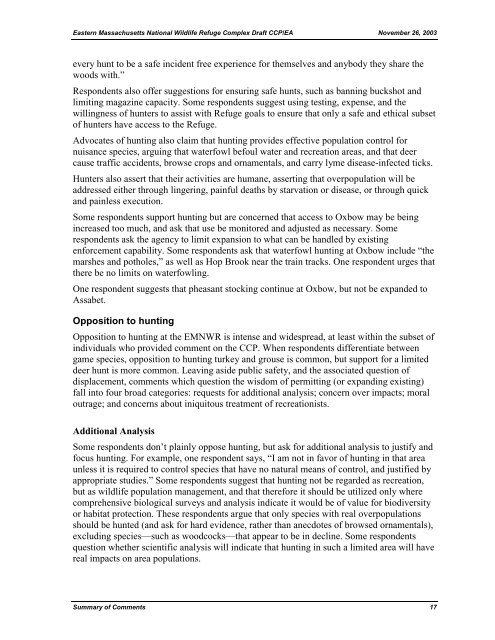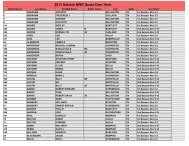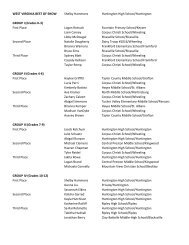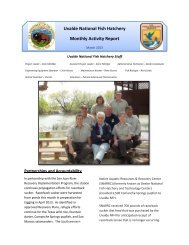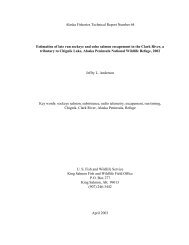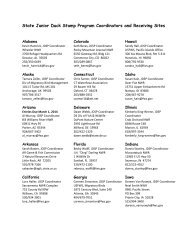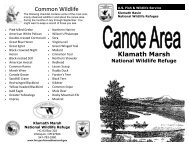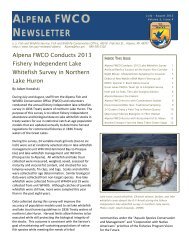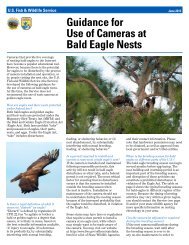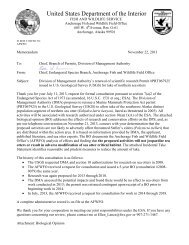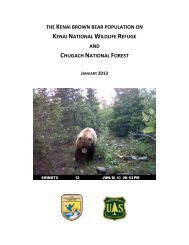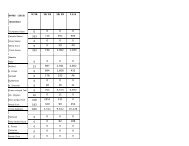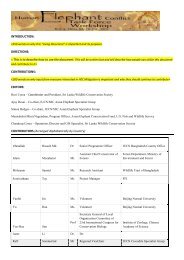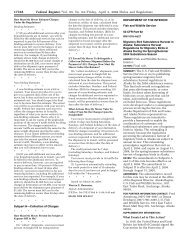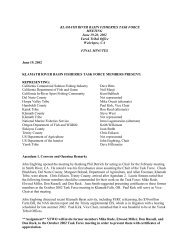Assabet River NWR Final CCP - U.S. Fish and Wildlife Service
Assabet River NWR Final CCP - U.S. Fish and Wildlife Service
Assabet River NWR Final CCP - U.S. Fish and Wildlife Service
You also want an ePaper? Increase the reach of your titles
YUMPU automatically turns print PDFs into web optimized ePapers that Google loves.
Eastern Massachusetts National <strong>Wildlife</strong> Refuge Complex Draft <strong>CCP</strong>/EA November 26, 2003<br />
every hunt to be a safe incident free experience for themselves <strong>and</strong> anybody they share the<br />
woods with.”<br />
Respondents also offer suggestions for ensuring safe hunts, such as banning buckshot <strong>and</strong><br />
limiting magazine capacity. Some respondents suggest using testing, expense, <strong>and</strong> the<br />
willingness of hunters to assist with Refuge goals to ensure that only a safe <strong>and</strong> ethical subset<br />
of hunters have access to the Refuge.<br />
Advocates of hunting also claim that hunting provides effective population control for<br />
nuisance species, arguing that waterfowl befoul water <strong>and</strong> recreation areas, <strong>and</strong> that deer<br />
cause traffic accidents, browse crops <strong>and</strong> ornamentals, <strong>and</strong> carry lyme disease-infected ticks.<br />
Hunters also assert that their activities are humane, asserting that overpopulation will be<br />
addressed either through lingering, painful deaths by starvation or disease, or through quick<br />
<strong>and</strong> painless execution.<br />
Some respondents support hunting but are concerned that access to Oxbow may be being<br />
increased too much, <strong>and</strong> ask that use be monitored <strong>and</strong> adjusted as necessary. Some<br />
respondents ask the agency to limit expansion to what can be h<strong>and</strong>led by existing<br />
enforcement capability. Some respondents ask that waterfowl hunting at Oxbow include “the<br />
marshes <strong>and</strong> potholes,” as well as Hop Brook near the train tracks. One respondent urges that<br />
there be no limits on waterfowling.<br />
One respondent suggests that pheasant stocking continue at Oxbow, but not be exp<strong>and</strong>ed to<br />
<strong>Assabet</strong>.<br />
Opposition to hunting<br />
Opposition to hunting at the EM<strong>NWR</strong> is intense <strong>and</strong> widespread, at least within the subset of<br />
individuals who provided comment on the <strong>CCP</strong>. When respondents differentiate between<br />
game species, opposition to hunting turkey <strong>and</strong> grouse is common, but support for a limited<br />
deer hunt is more common. Leaving aside public safety, <strong>and</strong> the associated question of<br />
displacement, comments which question the wisdom of permitting (or exp<strong>and</strong>ing existing)<br />
fall into four broad categories: requests for additional analysis; concern over impacts; moral<br />
outrage; <strong>and</strong> concerns about iniquitous treatment of recreationists.<br />
Additional Analysis<br />
Some respondents don’t plainly oppose hunting, but ask for additional analysis to justify <strong>and</strong><br />
focus hunting. For example, one respondent says, “I am not in favor of hunting in that area<br />
unless it is required to control species that have no natural means of control, <strong>and</strong> justified by<br />
appropriate studies.” Some respondents suggest that hunting not be regarded as recreation,<br />
but as wildlife population management, <strong>and</strong> that therefore it should be utilized only where<br />
comprehensive biological surveys <strong>and</strong> analysis indicate it would be of value for biodiversity<br />
or habitat protection. These respondents argue that only species with real overpopulations<br />
should be hunted (<strong>and</strong> ask for hard evidence, rather than anecdotes of browsed ornamentals),<br />
excluding species—such as woodcocks—that appear to be in decline. Some respondents<br />
question whether scientific analysis will indicate that hunting in such a limited area will have<br />
real impacts on area populations.<br />
Summary of Comments 17


